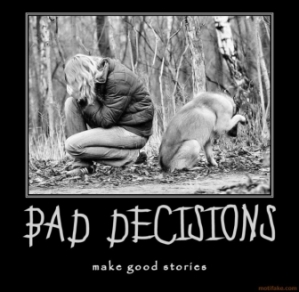Adult Truth #10
“Bad decisions make good stories.”
I'll wager you are thinking of several bad decisions in your life and how those could be turned into a short story or a scene in a novel. You may have to change the names/locations/dates to protect the guilty (and save yourself a lawsuit) or you may have to embellish the facts a bit to make the anecdote play out a little better in written form.
We've all made bad decisions. Some have ended in heartbreak or a job termination or (and I'm not included in this particular result) jail time. I made a bad decision as a child and was severely disciplined and my reaction to it was put into one of my first stories. Unfortunately, I made another bad decision in including the story and its related incident into a short bio which my first publisher decided to use in various author pages.
Subsequently, interviewers constantly ask me about that story.
Don't forget your bad decisions. Remember them so you'll know when you make them again. That's called experience.
What I'd like to have you consider, though, is the bad decisions of others. Part of being a good writer is observing and listening to the world around you. Every day people do stupid things. Or bad things. Or make the wrong decision even if they had good intentions. So what do people talk about when they meet? They share those bad decisions. Sometimes it's to teach a lesson to others, but a lot of times it's to share a laugh.
Don't dismiss these stories/episodes/anecdotes. Remember them. Jot notes for future reference.
It is a sad fact that nobody ever recorded the stories my grandfather told. Let me tell you a little about this man. He grew up in Illinois and for decades he lived in the Quad Cities. He watched the metropolis grow to engulf his house. Where houses now stand, there used to be apple orchards. He went out on dates with his future wife on horseback. He was a taxi driver, a volunteer fireman, a drill press operator, a small engine repairman, and I forget all the other jobs he had. I don't know how many things he built by hand in his shop.
In his life he met so many interesting people and he remembered those meetings and subsequent associations. Some of those adventures amazed him, humbled him, and taught him about human nature. I don't recall a time when he didn't have a story to relate at reunions or holiday dinners or on trips. I never heard the same story twice.
Did he stretch the truth? Probably. He certainly added a bit of colorful language to the tales. I wish I had had enough insight to remember those stories, write them down, record them. He told of his bad decisions and others'. He gave so much material, a good writer would never need to go looking for inspiration. I was never bored with him or wish he'd finish up so I could do something else. Once he started in on how a country boy won a contest determining the size of a giant set of overalls or his trip to Chicago then to Florida with a man who invented a new structural component to make buildings stronger or about some of the characters who came into the lawn mower shop, I didn't care about anything except listening.
I remember him when I listen to other people tell stories or share tidbits about their lives. When I was doing research for the sequel to Night Shadows I contacted an elderly aunt of my dad's and asked her to tell me stories of an old house in Illinois City. I wrote copious notes because she didn't want to be recorded.
Anytime I hear a story or anecdote I think is particularly unique I'll jot notes because some future story may be right for it.
Keep a pen and paper handy or if you can't, hone your memory until you can make notes.
Don't let a bad decision go to waste. Don't let somebody's mistake be forgotten. It doesn't necessarily have to come back to haunt you or the other person, but it certainly can make for great entertainment.
Welcome to
CrimeSpace
CrimeSpace Google Search
© 2024 Created by Daniel Hatadi.
Powered by
![]()

You need to be a member of CrimeSpace to add comments!